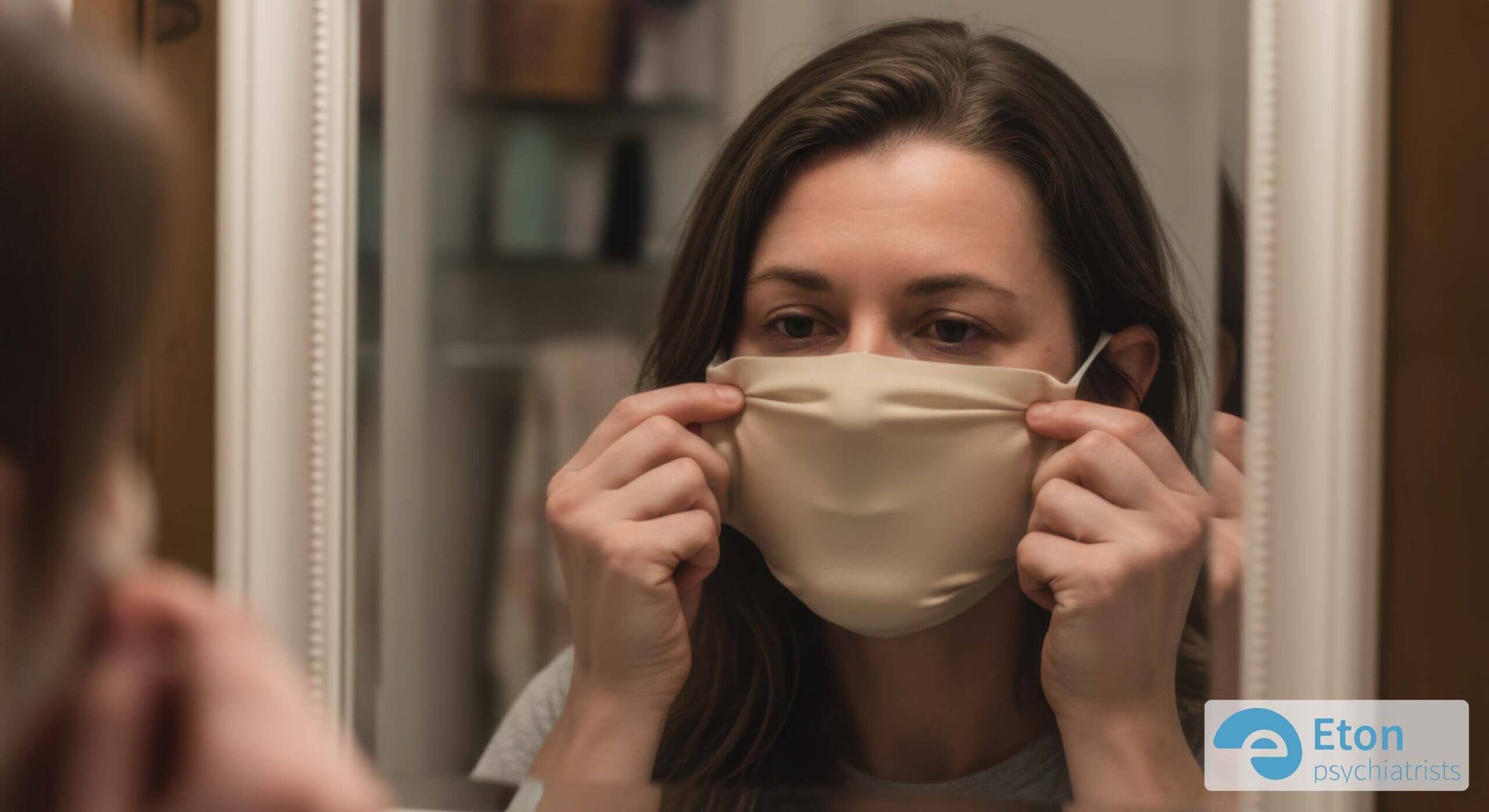
ADHD in Women: Why It’s So Often Missed
Listen to the Article
For those on the go or who prefer listening, you can play the full audio version of this deep dive below.

For countless women, the journey to an ADHD diagnosis is a long and winding road, often arriving decades late. Many high achieving women navigate life feeling like they are constantly on the edge of overwhelm, juggling careers, relationships, and households while battling an invisible current of disorganisation, anxiety, and self doubt. They are often told they are “too sensitive,” “too chatty,” or simply “stressed”. The reality is that they may be living with undiagnosed ADHD in women, a condition frequently missed due to outdated stereotypes, the unique presentation of symptoms, and the remarkable ability of women to mask their struggles. This systemic oversight has significant consequences for women’s mental health and well being. This guide explores the specific presentation of ADHD in adult women, the impact of hormonal fluctuations, the challenges of masking and misdiagnosis, and the path to clarity. Our goal is to validate the experiences of women with ADHD and provide the expert insight needed to understand why this condition remains so hidden.
Table of Contents
- The Stereotype Gap: Why ADHD in Girls is Overlooked
- Inattentive ADHD in Women: The Internal Struggle
- The Art of Masking: Hiding Symptoms at a High Cost
- Misdiagnosis: The Intersection of ADHD, Anxiety, and Depression
- The Hormonal Impact: Oestrogen, Perimenopause, and ADHD
- ADHD in Mothers: The Executive Function Overload
- Getting a Female ADHD Diagnosis in the UK
- Why Trust Eton Psychiatrists?
- Summary
- Sources
- Frequently Asked Questions
Why ADHD in Girls is Overlooked
The primary reason ADHD in women is so frequently missed begins in childhood. The traditional understanding of ADHD has been based on research conducted predominantly on young boys who exhibit externalising symptoms, such as disruptive behaviour, physical hyperactivity, and impulsivity. This created a deeply ingrained stereotype of what ADHD “looks like”.

Girls, however, often present differently. They are more likely to have the inattentive type of ADHD, which is quieter and less disruptive. Inattentive ADHD in girls manifests as daydreaming, difficulty following instructions, being easily distracted, or appearing “ditzy”. Instead of causing trouble in the classroom, their struggles are often internal. Furthermore, societal pressures often encourage girls to be compliant, organised, and conscientious. This leads them to work exceptionally hard to hide their difficulties, pleasing teachers and parents while internally struggling to keep up. Consequently, their genuine neurodevelopmental challenges are dismissed, leading to a significant gap in diagnosis and support.
Inattentive ADHD in Women: The Internal Struggle
As girls transition into adulthood, the presentation of ADHD evolves. The physical hyperactivity seen in children often transforms into an internal experience. For ADHD in adult women, this means a constant sense of restlessness, a racing mind that never stops, and difficulty relaxing. The symptoms of inattentive ADHD women are often subtle and easily attributed to other causes.
What are the symptoms of ADHD in women? They include profound challenges with executive function, the cognitive skills needed to manage daily life. This manifests as:
- Chronic disorganisation and clutter, despite efforts to maintain systems.
- Difficulty with time management and frequent lateness (time blindness).
- Procrastination and paralysis when faced with overwhelming tasks.
- Working memory issues, leading to forgetting appointments or losing track of conversations.
- Extreme emotional sensitivity and difficulty regulating emotions.
Women with ADHD often feel a deep sense of shame about these struggles, believing they are personal failings rather than symptoms of a neurodevelopmental condition. They may achieve academic or career success through sheer effort and intelligence, but the energy required to maintain this façade is immense.
The Art of Masking: Hiding Symptoms at a High Cost
“Masking” or “camouflaging” is a sophisticated survival strategy employed by many neurodivergent individuals, and it is particularly prevalent in women with ADHD. ADHD masking women involves consciously or unconsciously suppressing natural behaviours and performing neurotypical expectations to fit in and avoid judgement.

Masking can look like extreme perfectionism, spending hours longer on tasks than necessary to ensure they are flawless, hiding the underlying struggle with focus. It can involve meticulously scripting conversations, mimicking the social behaviours of peers, or developing elaborate organisational systems that are rigid and exhausting to maintain. It also involves internalising hyperactivity, suppressing the urge to fidget or move.
While masking can be effective in the short term, it comes at a tremendous cost. The constant self monitoring and suppression of one’s authentic self is mentally and physically draining. It is a primary driver of burnout, anxiety, and depression. It also contributes to a pervasive feeling of imposter syndrome, the belief that one is a fraud despite evidence of success. The impact of untreated ADHD in women often culminates in a crisis point where masking is no longer sustainable.
Misdiagnosis: The Intersection of ADHD, Anxiety, and Depression
When women with ADHD seek help, they are frequently misdiagnosed with mood disorders. The connection between ADHD and anxiety in women is particularly strong. The internal restlessness, racing thoughts, and constant worry about managing daily tasks present very similarly to generalised anxiety disorder. Similarly, the low self esteem, feelings of overwhelm, and emotional dysregulation associated with ADHD can be mistaken for depression.
It is crucial to understand that while anxiety and depression can co-occur with ADHD, they are often secondary conditions that arise from the chronic stress of living with undiagnosed and unsupported ADHD. When clinicians treat only the mood disorder without addressing the underlying ADHD, treatment is often ineffective or incomplete. The woman may feel slightly better, but the core struggles with executive function remain, perpetuating the cycle of frustration and distress. A specialist assessment is essential to untangle these complex intersections and identify the root cause.
The Hormonal Impact: Oestrogen, Perimenopause, and ADHD
One of the most critical, yet often overlooked, factors influencing ADHD in women is the role of hormones. Oestrogen plays a significant role in the brain’s cognitive functions, including the regulation of dopamine and norepinephrine, the neurotransmitters implicated in ADHD. The link between ADHD and oestrogen means that fluctuations in hormone levels throughout a woman’s life can significantly impact the severity of ADHD symptoms.

Many women report that their ADHD symptoms worsen during the premenstrual phase, the week before their period, when oestrogen levels drop. This hormonal ADHD can lead to increased irritability, brain fog, and emotional sensitivity. The link between ADHD and periods is a significant factor in the fluctuating severity of symptoms throughout the month.
The most profound impact is often seen during major hormonal transitions, such as pregnancy and perimenopause. The relationship between ADHD and perimenopause is particularly challenging. As oestrogen levels decline during this period, cognitive functions that were already strained by ADHD become even more compromised. Women who have successfully managed their ADHD symptoms for years may suddenly find their coping mechanisms failing. They experience significant increases in memory problems, inattention, and emotional volatility. This is often the trigger that leads many women in their 40s and 50s to seek a late diagnosis.
ADHD in Mothers: The Executive Function Overload
Motherhood places immense demands on executive function. The constant need to plan, organise, multitask, and manage the needs of children can be overwhelming for any parent, but for ADHD in mothers, it can feel impossible. The sensory overload of a noisy household, the disruption of routines, and the pressure to manage not only their own lives but the lives of their children can exacerbate ADHD symptoms significantly.
Mothers with ADHD often struggle with guilt and feelings of inadequacy, comparing themselves to neurotypical mothers who seem to manage effortlessly. They may find it difficult to maintain consistency in parenting, struggle with emotional regulation during stressful situations, and feel overwhelmed by the mundane tasks of household management. Accessing help for women with ADHD, particularly those navigating motherhood, is essential for the well being of the entire family.
Getting a Female ADHD Diagnosis in the UK
If you recognise yourself in these descriptions, seeking a professional assessment is a crucial next step. Navigating the path to a female ADHD diagnosis UK requires finding a clinician who understands the nuanced presentation of ADHD in women. It is important to advocate for yourself during the diagnostic process. Prepare for your assessment by documenting your experiences, not just your current struggles but also memories from childhood. Be explicit about your internal experiences, such as racing thoughts and emotional sensitivity, not just the external symptoms. Choosing a specialist clinic with expertise in adult ADHD and the complexities of female presentation can significantly improve the accuracy of the diagnosis. A diagnosis can be profoundly validating, providing an explanation for lifelong struggles and unlocking access to tailored support and treatment.
Why Trust Eton Psychiatrists?
Navigating the world of online health information can be confusing. Eton Psychiatrists is a specialist clinic dedicated to providing expert-led, compassionate care for adults with ADHD and Autism. We understand the complexities of neurodivergence, both online and off. We believe in empowering you with credible, reliable information so you can make the best decisions for your mental health. Our team has specific expertise in the nuanced presentation of ADHD in women and is committed to providing a supportive and validating diagnostic experience.
Summary
- Missed Diagnoses: ADHD in women is frequently overlooked because symptoms often present differently than the traditional male stereotype, and women are adept at masking their struggles.
- Inattentive Presentation: Women are more likely to have the inattentive type of ADHD, characterised by internal symptoms like daydreaming, disorganisation, and a racing mind, rather than external hyperactivity.
- The Cost of Masking: The immense effort required to hide ADHD symptoms and appear neurotypical (masking) leads to exhaustion, burnout, anxiety, and imposter syndrome.
- Misdiagnosis is Common: ADHD symptoms in women are often misdiagnosed as anxiety or depression, leaving the underlying condition untreated.
- Hormonal Impact: Fluctuations in oestrogen significantly affect ADHD symptoms, often worsening before periods and during perimenopause, which frequently triggers late diagnosis.
- Specialist Assessment is Key: An accurate diagnosis requires an assessment by a clinician experienced in the subtle and complex presentation of ADHD in adult women.
Sources
Frequently Asked Questions
What are the most common signs of ADHD in women?
Common signs are often internal and easily missed. They include chronic disorganisation, time management difficulties, feeling constantly overwhelmed, procrastination, a racing mind, internal restlessness, and high levels of emotional sensitivity. Women often excel in some areas while struggling significantly in others, leading to confusion and self doubt.
Why does ADHD seem to get worse during perimenopause?
Oestrogen plays a crucial role in supporting cognitive functions and the regulation of dopamine in the brain. During perimenopause, oestrogen levels decline significantly. This drop removes a layer of hormonal support, exacerbating underlying ADHD symptoms such as brain fog, memory issues, inattention, and emotional dysregulation.
How can I tell the difference between anxiety and ADHD in women?
It can be challenging as the symptoms often overlap, such as racing thoughts and restlessness. However, the root cause is different. Anxiety is often rooted in worry about the future or perceived threats, while ADHD related anxiety is often secondary to the stress of executive dysfunction (e.g., anxiety about missing deadlines or managing tasks). A comprehensive assessment by a specialist is necessary to differentiate between the two or diagnose both if they co-occur.
Is it possible to be successful and still have ADHD?
Yes, absolutely. Many women with ADHD are highly intelligent and successful in their careers and personal lives. They often achieve this by developing sophisticated masking strategies and exerting immense effort, often relying on the adrenaline of last minute deadlines to push through tasks. However, the energy required to maintain this level of functioning is often unsustainable and can lead to burnout.



